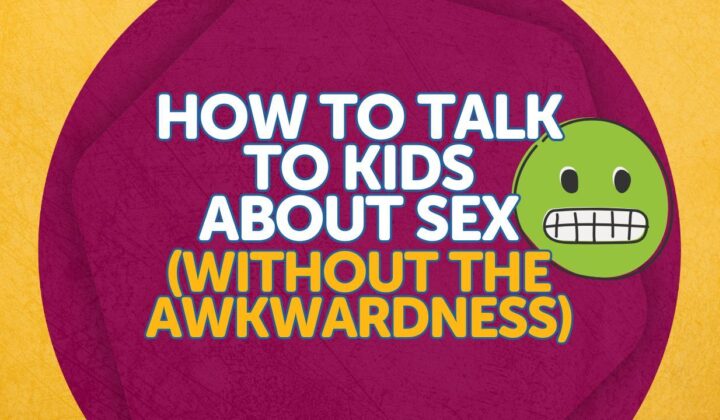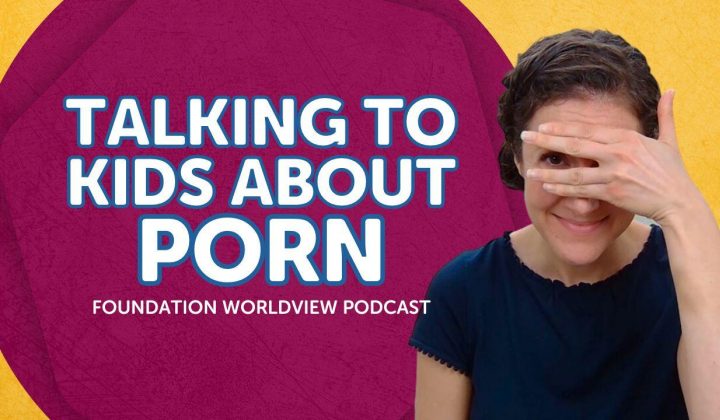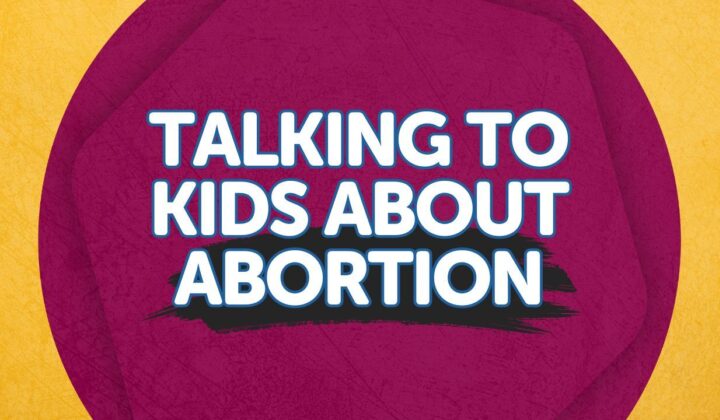Learn more about the journey that led to us equipping kids to carefully evaluate every idea they encounter.
Meet members of our team who have contributed to curriculum development.
Hear from real users of the Foundation Curriculum.
Learn what we believe about God, Jesus, Scripture, and more.
How and When to Talk to Girls About Menstruation
Talking to Young Girls About Menstruation
Foundation Worldview Podcast with Elizabeth
Today's podcast question asks: "How and when do I talk to my two young girls, ages three and five, about a woman's menstrual cycle? We have already talked with them about gender, sex, and reproduction through 'The Talk'...Made Easy miniseries."
I'm so grateful that you've taken your girls through that series! If you're listening or watching and haven't yet checked out that mini-series, 'The Talk'...Made Easy, and you have children under the age of eight, I highly recommend it to begin talking with your children about God's good design for sex.
I'm grateful this question came in because it's important, especially if we're parenting girls. We want to ensure we have this conversation about menstruation before our girls reach an age where they may begin menstruating.
Today on the Foundation Worldview Podcast, we'll dive deep into this question. Our goal is to equip the children God has placed in your care to carefully evaluate every idea they encounter and understand the truth of the biblical worldview.
When Should We Begin This Conversation?
There are two parts to this question: when should we begin this conversation, and how do we do it in a way that's both developmentally appropriate and theologically accurate?
I recommend having the first conversation about a woman's menstrual cycle with girls between the ages of five and eight. Obviously, you'll need to have already started the sex talk with them (which we recommend around age four for regular podcast listeners).
I recommend eight as the highest age because in the United States, the average age of first menstruation is 11. If there's no father present in the home, that age drops an entire year to 10. Since most girls in the U.S. start their period around 10-11, we want to make sure we have this conversation well before there's any chance of them beginning menstruation.
We also want to make sure they're learning about this part of God's design from us and not from someone else. As I frequently mention when talking about God's design for sex, we want to establish ourselves as the expert so our children come to us with their questions. To establish ourselves as the expert, we need to be the ones having this first conversation.
How To Start The Conversation
The more complicated question is how to begin this conversation in a way that's both developmentally appropriate and theologically accurate.
I recommend opening by reviewing that God designed sex to be the confirmation of the marriage covenant, and in His goodness, God designed sex to lead to babies. You can ask your girls:
"Do you remember what we learned about sex? That's right, we learned that it's the gift God has given to a husband and wife to confirm the promise of marriage."
Then ask them: "Do you remember what other good thing can happen when a husband and wife come together and confirm their promise of marriage through sex? That's right, sex can lead to babies."
Review how that happens: "Do you remember the two parts necessary from a woman's body and a man's body to create a baby?" Talk about how it's the man's sperm and the woman's egg, and when they meet, a baby begins to grow.
After reviewing this groundwork, say: "I want to talk to you about another part of this process that God designed."
Explaining The Menstrual Cycle
Explain that a woman's body releases one egg each month. Make sure to explain this is not like a chicken's egg, as most children's familiarity with eggs comes from chicken eggs, which are vastly different in size and location from a female's reproductive eggs.
Explain that this egg is actually tinier than the tip of a pen. You can take out a pen and have your girls point to the tip and say, "Did you know that the eggs inside a woman's body are even tinier than that?"
Explain that it stays inside a woman's body—it's not like a chicken's egg that's laid and then turned into breakfast or hatched into a new chicken.
Remind them that if that tiny egg connects with a man's sperm, a baby begins to grow safely inside her womb (or uterus, whichever term you're more comfortable with).
Then explain that many times—in fact, most times—when a woman's body releases an egg, that egg does not connect with a sperm. When that happens, eventually the woman's body gets rid of the egg and also gets rid of the lining in her uterus that was growing to keep a baby safe.
Explain that this lining and egg are shed through her vagina. When this comes out, it looks a lot like blood because it is blood. However, when children hear "blood," they often think of injuries or something bad happening. Explain that this process usually does not involve pain. (Those of us who are women know symptoms vary, but we want to make sure our girls know this isn't a scary thing.)
It's part of God's design for a woman's body to prepare to release another egg the following month. Then assure your daughters: "Right now, this isn't going to happen to your body. This will start when you get a little older, probably around 11 or a little bit older."
Handling Questions
Especially if you're talking with girls between five and eight, they're probably going to have many questions. After explaining the process in basic terms while focusing on the goodness of God's design, allow them to ask questions.
Our kids might ask questions that either stump us, shock us, or surprise us. No matter what kind of questions they ask, we want to keep a pleasant face so we don't discourage them from asking other questions—even if we're freaking out inside or internally confused.
If you need more time to think through a question—either because you don't know the answer or you're shocked by what they've asked—it's okay not to answer immediately. You can say:
"I'm so happy you're thinking critically about this. You're using your mind to honor God, and I'm grateful for that. That's a great question! Mommy needs a little more time to think about this. Tonight (or tomorrow), we'll answer that question."
Make sure to follow up within 48 hours. What we want through this questioning time is to ensure our children feel comfortable coming to us not only now with their questions but later when other questions arise.
Talking With Boys
For boys, I don't think it's necessary to have this conversation as early since it's not something they'll personally experience. You can talk with them about it at a younger age if you wish, but waiting until they're 10 or a little older is perfectly fine.
I recommend having the conversation with boys by the time they turn 12, as you want to be the first person discussing this with them. By that age, their female peers will be beginning their menstrual cycles, and some may talk about it in front of your sons.
Continuing The Conversation
For those thinking about how to continue the conversation—because like our talks about God's design for sex, conversations about menstruation aren't one-and-done—I highly recommend the book "What's the Big Deal?" from the God's Design for Sex series by Stan and Brenna Jones. It's written specifically for children (both girls and boys) between the ages of 8 and 12.
This is a great follow-up resource. Once you've had these first foundational conversations, you can continue discussing this aspect of sexuality, as well as other aspects, through this book.
That's a wrap for this episode! If you have a question you'd like me to answer on a future Foundation Worldview podcast, you can submit it at FoundationWorldview.com/podcast.
As we leave our time together, my prayer for you is that no matter the situation in which you and the children God has placed in your care find yourselves, you would trust that God is working all things together for your good by using all things to conform you more into the image of His Son.
I'll see you next time.
Don’t miss the next conversation that matters
Join our email list and get biblically sound resources delivered straight to your inbox—so you're always one step ahead in discipling your kids through today's toughest topics.
👩👧 From God’s design for the body to big worldview questions, we’ll help you lead with clarity and confidence.
👉 Sign up today and stay equipped for the moments that matter most.
Related Posts and insights

How to Talk to Kids About Sex (Without the Awkwardness)
When should you talk to your kids about sex? What should you say, and how can you bring it up naturally? In this episode of the Foundation Worldview Podcast, Elizabeth Urbanowicz provides a framework for having age-appropriate conversations about body parts, the mechanics of sex, and reproduction—all while grounding the discussion in a positive, biblical perspective. Learn how to create a safe and open environment where your children can ask questions and receive clear, truthful answers from you.

How To Talk To Kids About Porn
In this episode of the Foundation Worldview Podcast, host Elizabeth Urbanowicz discusses the crucial topic of when and how to start talking about pornography with our kids. The episode covers important aspects such as being proactive in addressing the issue, understanding what children are exposed to, and building a positive biblical foundation for human dignity and God's design for sex and sexuality.

How and When to Talk to Your Child About Abortion
Discover how to talk to your child about abortion with biblical truth and age-appropriate clarity. Learn when to start and how to approach this vital topic.



